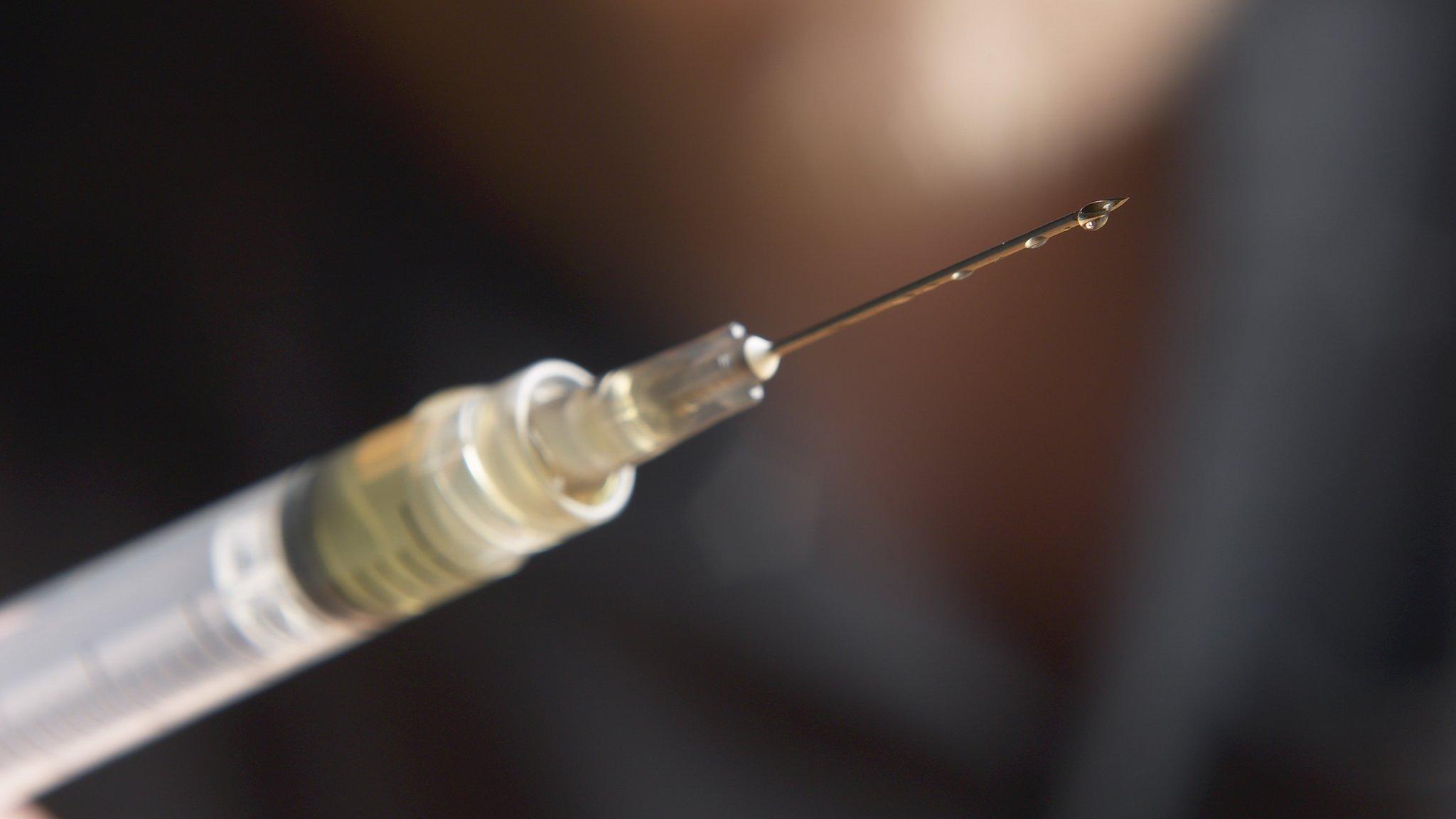Students targeted in MenW vaccination programme
- Published
Tracey Saunders describes how her son Edward died in a matter of hours
Teenagers going to university and college this year are being offered protection against a deadly strain of meningitis, called MenW.
GPs across the UK are inviting 17 and 18-year-olds to come for a vaccine. First-time students under 25 are eligible too.
There has been a steep rise in MenW cases since 2009 and experts say this group is particularly vulnerable.
Meningitis W also has a higher death rate than other strains of the disease.
Public Health England says it is important that anyone who plans to go to university this year gets vaccinated before they leave, because they will be mixing closely with lots of new people, some of whom may unknowingly be carrying the meningococcal bacteria.
Health experts in Scotland and Wales are also urging school-leavers and freshers to make an appointment at their GP surgery this summer.
The vaccination protects against meningitis and septicaemia caused by four meningoccocal strains - Men W, A, C and Y.
Teenagers born between 1 September 1996 and 31 August 1997 will be sent an invitation by their GP to come and receive the vaccination.

Meningitis
Meningitis is an infection of the meninges - the membrane that surrounds the brain and spinal cord
Meningococcal bacteria are common and carried harmlessly in the nose or throat by about one in 10 people
They are passed on through close contact
Symptoms include a high fever with cold hands and feet, agitation, confusion, vomiting and headaches
Parents and patients should not wait for a rash to develop before seeking medical help

First-time university entrants this year aged between 19 and 24 should also contact their GP for the vaccination.
Over the next two years, 14 to 17-year-olds will also be contacted to be offered the MenACWY vaccine.
The Joint Committee on Vaccination and Immunisation (JCVI) announced the vaccination programme in June because cases of MenW had increased from 22 cases in 2009 to 117 in 2014.
A highly aggressive strain of meningococcal disease, group W, was found to be behind the rise.

Case study: "I was very fortunate that I was assessed so quickly"

Darren Kinahan-Goodwin, 43, was hospitalised with bacterial meningitis last month.
"I would never have thought that I had meningitis, as I went to work in the morning feeling fine," he says. Darren, from Chesterfield, says he "had none of the classic meningitis symptoms" but as the day progressed, he "became increasingly confused".
"Twelve hours later I didn't even know the names of those close to me," he says.
"I was very fortunate that I was assessed so quickly at the A&E department at Chesterfield Royal Hospital, and treated with antivirals and antibiotics before any confirmation of infection was established."
It took five days before it was established Darren's condition had been caused by streptococcal pneumonia, but his confusion began to clear the morning after he was admitted to hospital.
"That shows how quick meningitis can occur but how it can often be treated effectively with rapid intervention," he adds.

MenW is currently responsible for about one quarter of all laboratory-confirmed meningococcal cases in England.
Dr Mary Ramsay, head of immunisation at Public Health England, said all eligible teenagers should take up the offer of the vaccination.
"If you're planning to go to university or college, you should be vaccinated before the start of the academic term or before leaving home for university or college (ideally two weeks in advance). Please make an appointment with your GP as soon as possible when the vaccine is offered."
Sue Davie, chief executive of Meningitis Now, said parents should ensure that their children get the MenACWY vaccination.
"It is critical that young people are not complacent about the disease and they take the necessary steps to protect themselves, stay vigilant and seek urgent medical help if they suspect it."
Chris Head, chief executive of the Meningitis Research Foundation, said he was delighted that the government had moved quickly to stop the rise of MenW.
"The rise in MenW disease is particularly worrying as it causes more severe illness and a higher death rate than other strains.
"We urge all who are eligible to make sure they get MenACWY vaccine."
- Published13 March 2015

- Published21 June 2015
